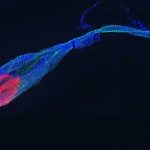Link to Pubmed [PMID] – 16140958
Cancer Res. 2005 Sep;65(17):7880-7
An incomplete elongation of O-glycan saccharide chains in mucins have been found in epithelial cancers, leading to the expression of shorter carbohydrate structures, such as the Tn antigen (GalNAc-O-Ser/Thr). This antigen is one of the most specific human cancer-associated structures and is capable of inducing effective immune responses against cancer cells. We aimed to investigate the causes of the expression of Tn antigen in the Tn-rich MCF-7 breast cancer cell line focusing on the first step of the O-glycosylation process. Interestingly, amino acid sequences derived from “non-mammary” apomucins (MUC5B and MUC6) were very good acceptor substrates for ppGalNAc-Ts, which are the enzymes catalyzing the Tn antigen synthesis. MUC6 peptide glycosylation with MCF-7 microsome extracts as source of ppGalNAc-T activity yielded 95% conversion of the peptide into MUC6-Tn. In addition, the MUC6-Tn glycopeptide was a poor acceptor substrate for core 1 beta3Gal-T, the next enzyme involved in the saccharide chain biosynthesis, yielding only 5% conversion of MUC6-Tn into MUC6-TF. These results indicate that non-mammary apomucin expression could be responsible, at least in part, for Tn antigen expression in MCF-7 breast cancer cells due to a combined action on glycosyltransferases: an increase of ppGalNAc-T activity and a decrease of core 1 beta3Gal-T activity. Our hypothesis is supported by experiments in vivo showing that (a) native MUC6 glycoproteins express the Tn antigen in MCF-7 cells and (b) Tn antigen expression is increased after transfection with a construct encoding for a MUC6 recombinant protein into the low Tn-expressing breast cancer cell T47D. These results open new horizons in breast cancer glycoimmunology, stressing the potential role of non-mammary apomucins.

